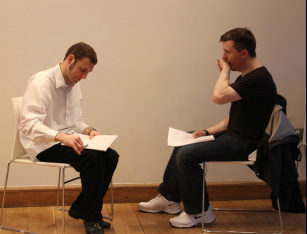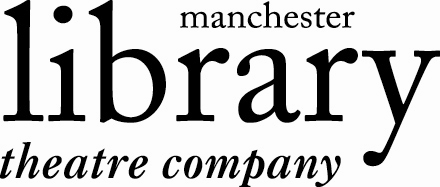
Interpreting dialogue from the page can be a tricky process for an actor starting out. Particularly in theatre, a character’s lines might not always be what they seem. Often a character might say one thing but mean something else entirely.
The idea of the Honest project has been for workshop members to develop their own characters, their personalities, traits and mannerisms – and delivery and inflection are integral parts of this process. It was for this reason that, when writing the script, I completely omitted the use of any directional adverbs (such as [angrily] [sarcastically] [worriedly] etc.). What we really wanted was for the group to come up with their delivery styles on their own.
To help them achieve this, Rosie came up with the following ‘Aims and Objectives’ exercise. This involved them getting into pairs with scene partners, and assessing each line one by one to determine the motivation behind what their characters were saying.
So, for instance, let’s take an excerpt from a scene between Honest and Chubb:
HONEST: Chubb? Hiya mate!
CHUBB: Oh for God’s sake.
HONEST: Fancy seeing you here. How’s it going?
CHUBB: Brill.
HONEST: So this is your regular watering hole is it?
CHUBB: For now yeah.
Here, we’ve got an exchange between two characters with utterly different attitudes towards each other.
On one hand, Honest is really making the effort with Chubb. By greeting him, Honest is indicating that he wants to befriend Chubb and get into a conversation.
So, at its most basic, ‘Hiya mate!’ actually means: ‘Hey. I want to be friends. Talk to me.’
Chubb, however, doesn’t want to know, and makes that clear:
‘Oh for God’s sake’ is a thinly veiled way of saying: ‘Oh no. Not you again. I don’t like you.’
By repeating this process for the rest of the scene, we get something like this:
HONEST: Chubb? Hiya mate! (Hey. I want to be friends. Talk to me.)
CHUBB: Oh for God’s sake. (Oh no. Not you again. I don’t like you.)
HONEST: Fancy seeing you here. How’s it going? (I’m making the effort. By asking him how he is I might get him to open up to me.)
CHUBB: Brill. (LEAVE ME ALONE.)
HONEST: So this is your regular watering hole is it? (I’m persevering.)
CHUBB: For now yeah. (But not for much longer, if people like you are coming down here now.)
After this process, Rosie got the pairs to act their scene out in front of the rest of the group – but openly stating their intentions behind their lines to the audience, before actually speaking them.
What we noticed then was a lot more authenticity and feeling behind their delivery. Characters’ motivations were fresh in their minds, and they were now revealing their real intentions through the way they delivered their dialogue.
As with most characterisation exercises for actors, this process is also incredibly useful for writers trying to work out the true meaning behind their characters’ dialogue. When writing a script, I’m often guilty of writing lines which might appear different from those preceding it, but actually mean the same thing. An exercise like this is particularly helpful in highlighting duplicates, and determining which lines you can afford to lose to tighten things up.
The idea of the Honest project has been for workshop members to develop their own characters, their personalities, traits and mannerisms – and delivery and inflection are integral parts of this process. It was for this reason that, when writing the script, I completely omitted the use of any directional adverbs (such as [angrily] [sarcastically] [worriedly] etc.). What we really wanted was for the group to come up with their delivery styles on their own.
To help them achieve this, Rosie came up with the following ‘Aims and Objectives’ exercise. This involved them getting into pairs with scene partners, and assessing each line one by one to determine the motivation behind what their characters were saying.
So, for instance, let’s take an excerpt from a scene between Honest and Chubb:
HONEST: Chubb? Hiya mate!
CHUBB: Oh for God’s sake.
HONEST: Fancy seeing you here. How’s it going?
CHUBB: Brill.
HONEST: So this is your regular watering hole is it?
CHUBB: For now yeah.
Here, we’ve got an exchange between two characters with utterly different attitudes towards each other.
On one hand, Honest is really making the effort with Chubb. By greeting him, Honest is indicating that he wants to befriend Chubb and get into a conversation.
So, at its most basic, ‘Hiya mate!’ actually means: ‘Hey. I want to be friends. Talk to me.’
Chubb, however, doesn’t want to know, and makes that clear:
‘Oh for God’s sake’ is a thinly veiled way of saying: ‘Oh no. Not you again. I don’t like you.’
By repeating this process for the rest of the scene, we get something like this:
HONEST: Chubb? Hiya mate! (Hey. I want to be friends. Talk to me.)
CHUBB: Oh for God’s sake. (Oh no. Not you again. I don’t like you.)
HONEST: Fancy seeing you here. How’s it going? (I’m making the effort. By asking him how he is I might get him to open up to me.)
CHUBB: Brill. (LEAVE ME ALONE.)
HONEST: So this is your regular watering hole is it? (I’m persevering.)
CHUBB: For now yeah. (But not for much longer, if people like you are coming down here now.)
After this process, Rosie got the pairs to act their scene out in front of the rest of the group – but openly stating their intentions behind their lines to the audience, before actually speaking them.
What we noticed then was a lot more authenticity and feeling behind their delivery. Characters’ motivations were fresh in their minds, and they were now revealing their real intentions through the way they delivered their dialogue.
As with most characterisation exercises for actors, this process is also incredibly useful for writers trying to work out the true meaning behind their characters’ dialogue. When writing a script, I’m often guilty of writing lines which might appear different from those preceding it, but actually mean the same thing. An exercise like this is particularly helpful in highlighting duplicates, and determining which lines you can afford to lose to tighten things up.


 RSS Feed
RSS Feed